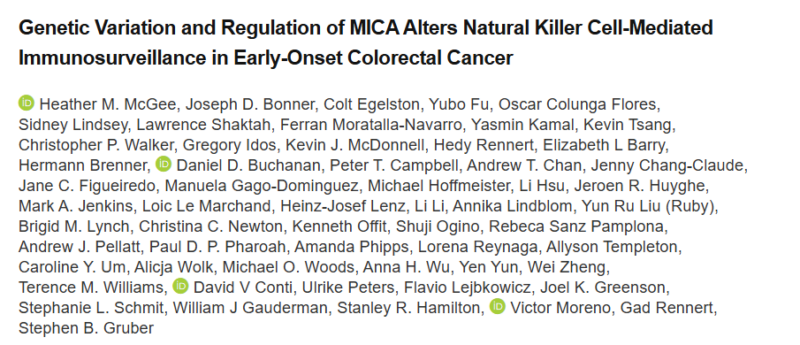These novel findings suggest that EOCRC may have a previously unrecognized innate immune-mediated etiology which merits further investigation.”

Heather McGee: Genetic Variation and Regulation of MICA in Early-Onset Colorectal Cancer
Heather McGee, Radiation Oncologist, Immunologist at City of Hope, shared on X about recent paper by her as first author, titled “Genetic Variation and Regulation of MICA Alters Natural Killer Cell-Mediated Immunosurveillance in Early-Onset Colorectal Cancer” published on medRxiv.
Authors: Heather M. McGee, Joseph D. Bonner, Colt Egelston, Yubo Fu, Oscar Colunga Flores, Sidney Lindsey, Lawrence Shaktah, Ferran Moratalla-Navarro, Yasmin Kamal, Kevin Tsang, Christopher P. Walker, Gregory Idos, Kevin J. McDonnell, Hedy Rennert, Elizabeth L. Barry, Hermann Brenner, Daniel D. Buchanan, Peter T. Campbell, Andrew T. Chan, Jenny Chang-Claude, Jane C. Figueiredo, Manuela Gago-Dominguez, Michael Hoffmeister, Li Hsu, Jeroen R. Huyghe, Mark A. Jenkins, Loic Le Marchand, Heinz-Josef Lenz, Li Li, Annika Lindblom, Yun Ru Liu (Ruby), Brigid M. Lynch, Christina C. Newton, Kenneth Offit, Shuji Ogino, Rebeca Sanz Pamplona, Andrew J. Pellatt, Paul D. P. Pharoah, Amanda Phipps, Lorena Reynaga, Allyson Templeton, Caroline Y. Um, Alicja Wolk, Michael O. Woods, Anna H. Wu, Yen Yun, Wei Zheng, Terence M. Williams, David V. Conti, Ulrike Peters, Flavio Lejbkowicz, Joel K. Greenson, Stephanie L. Schmit, William J. Gauderman, Stanley R. Hamilton, Victor Moreno, Gad Rennert, Stephen B. Gruber.

“I am excited to share a discovery from a large international collaboration led by City of Hope published on PubMed this week:
Genetic Variation and Regulation of MICA Alters Natural Killer Cell-Mediated Immunosurveillance in Early-Onset Colorectal Cancer.
The incidence of colorectal cancer among individuals under age 50, or early-onset CRC (EOCRC), has been rising over the past few decades for unclear reasons, and the etiology of the disease remains largely unknown.
Known genetic risk factors do not explain this increase, pointing to possible environmental and as-yet unidentified genetic contributors and their gene-environment interactions.
Previous research linked genetic variation on chromosome 6 to increased CRC risk. This region harbors multiple immune genes, including the gene encoding Major Histocompatibility Complex class I polypeptide-related sequence A (MICA).
MICA is a polygenic ligand for the Natural Killer Group 2D receptor (NKG2D) expressed on NK cells and other lymphocytes. Given that intratumoral NK cell infiltration correlates with CRC outcomes, we hypothesized germline genetic variation in MICA could influence CRC risk.
In collaboration with Dr. Stephen Gruber and international colleagues, we looked in a discovery set of 40,125 cases and controls, and showed that the minor G allele in MICA at Chr6:31373718C>G is associated with increased risk for CRC (OR = 1.09, 95% CI 1.04 – 1.15, p = 0.0009).
The effect is stronger in EOCRC (OR = 1.26, 95% CI 1.08 – 1.44, p = 0.0023) than in those 50 and over (OR = 1.07, 95% CI 1.02 – 1.13; p = 0.012) (Ratio of ORs = 1.32, 95% CI 1.14 – 1.52, p = 0.0002). Collaboration with our colleagues at USC, we looked in an independent validation set of 77,983 cases and controls, the adjusted interaction by age-of-onset was significant at OR = 1.15 (95% CI 1.03 – 1.34, p = 0.0150) with a higher risk in EOCRC.
Expression quantitative trait locus analysis in normal colonic epithelia showed that MICA RNA expression decreases linearly with each additional copy of the minor G allele (p = 3.345 × 10e-18).
Bulk RNA sequencing analysis of the tumor immune microenvironment revealed that tumors from patients with CG or GG genotypes have lower resting and activated NK cell infiltration compared to tumors from patients with CC genotype.
In collaboration with Colt Egelston, we performed multiplex immunofluorescence which demonstrated that patients with a G allele have a statistically significant decrease in the of NK cells in tumor compared to adjacent normal colonic mucosa.
-
Challenging the Status Quo in Colorectal Cancer 2024
December 6-8, 2024
-
ESMO 2024 Congress
September 13-17, 2024
-
ASCO Annual Meeting
May 30 - June 4, 2024
-
Yvonne Award 2024
May 31, 2024
-
OncoThon 2024, Online
Feb. 15, 2024
-
Global Summit on War & Cancer 2023, Online
Dec. 14-16, 2023
